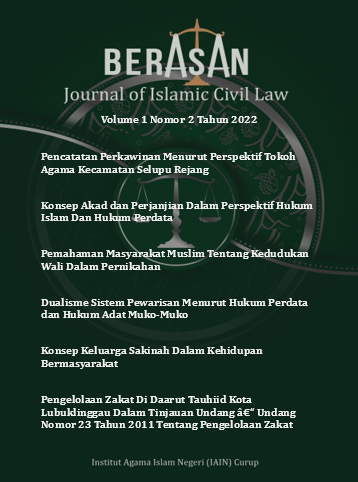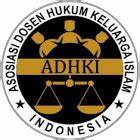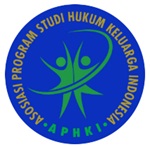Pengelolaan Zakat Di Daarut Tauhiid Kota Lubuklinggau Dalam Tinjauan Undang – Undang Nomor 23 Tahun 2011 Tentang Pengelolaan Zakat
DOI:
https://doi.org/10.29240/berasan.v1i2.5888Keywords:
Zakat, LAZ Daarut Tauhid Peduli, ManagementAbstract
The purpose of this study is to find out the management of Zakat, Infak and Sadaqah in Daarut Tauhiid Peduli Lubuklinggau and the perspective of Law No. 23 of 2011  as the basis for the presence of the Amil Zakat Institution (LAZ) Daarut Tauhiid Peduli Lubuklinggau City. The method used in this study is a qualitative method. Data collection was carried out using field research observations, interviews and documentation at the Amil Zakat Daarut Tauhiid Lubuklinggau Institute. The collected data is then analyzed using descriptive analysis, reduced, then dissented or inferred. The results of the study are the management of zakat, infak and alms at the Daarut Tauhiid Peduli Lubuklinggau amil zakat institution in terms of collection, distribution, utilization, has referred to Law No. 23 of 2011.  This is based on the periority scale by paying attention to equity, justice and territoriality. Meanwhile, the utilization of zakat has also been distributed for several program developments such as productive efforts on the economic pillar, namely resilient villages so that it becomes an added value for the existence of the Amil Zakat Daarut Tauhiid Peduli Lubuklinggau Institution to become the community's choice in zakat management.
Downloads
References
Asnaini, Zakat Produktif dalam Perspektif Hukum Islam, Yogyakarta: Pustaka Pelajar, 2008.
Abi Muhammad Azha, Risalah Zakat, Kediri: Santri Creative Press & Publishing, 2016.
Abdul Al-Hamid Mahmud dan Al-Ba’ly, Ekonomi Zakat: Sebuah Kajian Moneter..., hal. 8
Elsa Kartika Sari, Pengantar Hukum Zakat dan Wakaf, Jakarta: PT. Grasindo, 2006.
Ahmad Rofiq, Fiqh Kontekastual: dari Normatif ke Pemaknaan Sosial, Yogyakarta:Pustaka Pelajar, 2004.
Fahrur Mu’is, Zakat A-Z Panduan Mudah, Lengkap, dan Praktis tentang Zakat, Solo: Tinta Medina, cet. 1.
Hafidhudhin, Didin, Zakat dalam Perekonomian Moderni, Jakarta: Gema Insani, 2002,
Hasan, M. Ali. 2006. Zakat dan Infak Salah Satu Solusi Mengatasi Problema Sosial di Indonesia. Jakarta: Kencana. 2009.
HAMKA, Keadilan Sosial dalam Islam, Jakarta: Widjaya, 1993
Hasan, M. Ali. Zakat dan Infak Salah Satu Solusi Mengatasi Problema Sosial di Indonesia. Jakarta: Kencana. 2006.
Khasanah, Umratul. Manajemen Zakat Modern Instrumen Pemberdayaan Ekonomi Umat. Malang:UIN Malang Press. 2010.
Moleong, lexy. Metodologi Penelitian.Bandung: PT. Remaja Rosada Karya. 2002.
Moleong, lexy. Metodologi Penelitian. Bandung:PT.Remaja Rosada Karya. 2004.
Nawawi, Hadari, Metode Penelitian Bidang Sosial. Yogyakarta: Gadjah Mada University Press. 1995.
Romy, Suemitro. 1990. Metodologi Penelitian Hukum dan Jurementri.
Jakarta: Ghalia Indonesia. 1990.
Saifudin Zuhri, Zakat di Era Reformasi (Tata Kelola Baru), Semarang: Fakultas Tarbiyah IAIN Walisongo, 2012.
Sugiyono, Metode Penelitian Kuantitatif Kualitatif dan R&D, 2009. Soekanto, Soerjono. Pengantar Penulisan Hukum. Jakarta: UI Press. 1986. Sudirman. Zakat dalam Pusaran Arus Modernitas. Malang:UIN Malang
Press. 2007.
Teuku Muhammad Hasby Ash-Shiddiqy, Pedoman Zakat, Semarang: PT. Pustaka Rizki Putra, 2009.
Undang Undang RI No 23 Tahun 2011 tentang Pengelolaan Zakat
Undang-Undang Nomor 38 Tahun 1999 Tentang Pengelolaan Zakat, Pasal
(1)
Departemen Agama RI, Fiqih Zakat, Jakarta: Direktorat Pemberdayaan Zakat, 2008.
https://www.uta45jakarta.ac.id/pemutusan-hubungan-kerja-phk-di-era-pan demi-perspektif-hukum-tak-mudah-perusahaan-lakukan-phk/ diakses 20 Juni 2021
https://anggaran.kemenkeu.go.id/in/post/perubahan-postur-dan-rincian-apb n-2020-di-masa-pandemi-covid-19 diakses 20 Juni 2021
http://www.kemenag.go.id/index.php?a=berita&id=233570 diakses
/02/2021
https://www.kemenkopmk.go.id/menko-pmk-fokus-si-miskin-zakat-bisa-p ulihkan-ekonomi-nasional diakses 20 Juni 2021
Downloads
Additional Files
Published
Issue
Section
Citation Check
License
Authors who publish with Berasan: Journal of Islamic Civil Law agree to the following terms:
- Authors retain copyright and grant the journal right of first publication with the work simultaneously licensed under a Creative Commons Attribution-NonCommercial-ShareAlike 4.0 International License (CC BY-NC-SA 4.0) that allows others to share the work with an acknowledgment of the work's authorship and initial publication in this journal.
- Authors are able to enter into separate, additional contractual arrangements for the non-exclusive distribution of the journal's published version of the work (e.g., post it to an institutional repository or publish it in a book), with an acknowledgment of its initial publication in this journal.
- Authors are permitted and encouraged to post their work online (e.g., in institutional repositories or on their website) prior to and during the submission process, as it can lead to productive exchanges, as well as earlier and greater citation of published work (See The Effect of Open Access).









